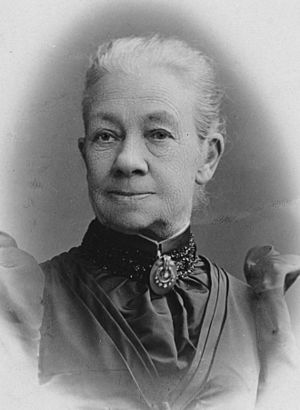Mary Colton facts for kids
Mary Colton (born Mary Cutting) was an important Australian woman. She lived from 1822 to 1898. People often called her "Lady Colton." She was known for helping others and for fighting for women's rights.
Contents
Early Life and Family
Mary Colton was born in London, England, on December 6, 1822. She was the oldest of three children. Her father, Samuel Cutting, was a bootmaker.
In 1839, when she was about 17, Mary moved to Adelaide, South Australia. She traveled with her father, her brother Alfred, and her sister Hannah. They arrived in June 1840.
In 1844, Mary married John Colton. He was a saddler and merchant who later became a politician. Mary and John had nine children together. Sadly, some of their children died when they were very young. Her last child was born in 1865.
Helping Others (Philanthropy)
Mary Colton worked very hard to help people who were poor or in need. She especially cared about women and children.
She was a dedicated Methodist and started her charity work with church groups. These groups included the Dorcas Society and the South Adelaide Wesleyan Ladies' Working Society. She also helped with the Nursing Sisters' Association.
In the 1860s, Mary was on a committee that helped run the Servant's Home. This place offered shelter to women who had just arrived in Australia. It also helped servants find jobs.
In 1867, she joined the ladies' committee of the Female Refuge. This refuge provided a safe place for women and girls who needed help.
Mary was a founder of the Adelaide Children's Hospital in 1876. She stayed on the hospital's management board for the rest of her life.
She supported many other causes too. These included the Home for Incurables and the Maternity Relief Association. She also helped the Strangers' Friend Society. In the 1880s and 1890s, she visited women in prison. As president of the Adelaide Female Reformatory, she helped them after they were released.
Working for Change (Social Activism)
Mary Colton was also active in making important social changes. In 1870 and 1872, she joined groups that asked the South Australian government to change how they cared for children. They wanted children to live with families instead of in large institutions.
Their efforts succeeded in 1872. After this, Mary worked on the Boarding-out Society's committee. She then joined the State Children's Council. This council was important for overseeing children in foster homes, reformatories, or industrial schools.
In 1883, she became the treasurer and then president of a new group. This group was part of the Social Purity Society. They successfully campaigned to raise the age of protection for young people.
Young Women's Christian Association (YWCA)
Mary Colton spent her life helping young women. She was especially concerned about girls who did not have a family home.
In 1884, she helped start a club for working girls. This club had a Christian focus. In December of that year, it became a branch of the Young Women's Christian Association.
Mary remained the president of the YWCA for the rest of her life. She helped open residential buildings in the city for young women. She also started branches in the suburbs. She successfully expanded religious meetings, clubs, and classes. These activities helped support the work of churches.
Women's Suffrage League
In May 1892, Mary Colton became the President of the Women's Suffrage League. This group worked to give women the right to vote. She led the league through many challenges.
Mary was widely known and respected for her hard work helping others. This respect likely helped convince some people to support women's right to vote. When the law giving women the right to vote was passed in March 1895, Mary was greatly praised. The league then met to close down, having achieved its goal.
Later Life
In 1891, Mary's husband was given the title of knight. After this, she became known as Lady Mary Colton.
She passed away at her home on July 30, 1898. She was buried in West Terrace cemetery. Her husband, one daughter, and four of her sons survived her.
Two places were named in her honor. One is the Colton Ward at the Women's and Children's Hospital. The other is Lady Colton Hall in the 1900 YWCA building on Hindmarsh Square.
See also
 In Spanish: Mary Colton para niños
In Spanish: Mary Colton para niños
 | Roy Wilkins |
 | John Lewis |
 | Linda Carol Brown |


